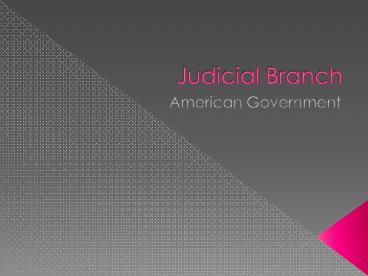Judicial Branch - PowerPoint PPT Presentation
1 / 21
Title:
Judicial Branch
Description:
Review ___concurrent jurisdiction ___original jurisdiction ___appellate jurisdiction ___Judicial Review ___due process clause. A. states that no states may deprive a ... – PowerPoint PPT presentation
Number of Views:180
Avg rating:3.0/5.0
Title: Judicial Branch
1
Judicial Branch
- American Government
2
Jurisdiction of Courts
- State courts have jurisdiction over cases
involving state laws. - Federal courts have jurisdiction over cases
involving United States laws, foreign treaties,
and the interpretation of the Constitution.
3
The Federal (National) System is made of.
- Lower Courts
- District courts
- Courts of appeals
- Supreme Court
4
District courts
- There are 94
- Are the trial courts
- Hear facts / evidence
- Call witnesses
- Judge
- Jury
- Have Original Jurisdiction
5
Original Jurisdiction
- The authority to hear the first trial of a case.
6
District courts (cont.)
- District courts hear cases involving
- Constitution
- Federal laws
- Citizens from other countries
- Citizens of more than one state
- Federal cases
- Ex. Robbing bank in two states
- Bankruptcy
7
Court of Appeals
- There are 13 court of appeals
- They have appellate jurisdiction
8
Appellate Jurisdiction
- This means they can review cases that have
already been decided by a lower (district) court - For example, if a person is unhappy with a lower
courts verdict, he or she can appeal in the
court of appeals.
9
Court of Appeals (cont.)
- Make sure a person received all of his/her rights
during the trial - Can do three things.
- Reverse the original courts decision
- Agree with the decision
- Send the case back for a retrial
10
Jurisdiction
- The Judge that hears a case first has
- Original Jurisdiction
- Concurrent Jurisdiction
- Appellate Jurisdiction
- An Appellate Judge has higher authority than the
Judge with Original Jurisdiction - True
- False
11
- 3. How Many District Courts are there
- 80
- 35
- 94
12
The Supreme Court
13
The Supreme Court
- Is the highest judicial body in the United States
- Set up by the U.S. Constitution
- Meets in Washington D.C.
14
The Justices
- Consists of a Chief Justice and 8 Associate
Justices
Chief Justice John Roberts John Paul
Stevens Antonin Scalia Anthony Kennedy David
Souter Clarence Thomas Ruth Ginsburg Stephen
Breyer Sam Alito
15
The Supreme Court
- Justices are nominated by the President, and
approved by the Senate. - Justices hold their office for LIFE
- Their duties are not defined in the Constitution
- The Supreme Court has become the most powerful
court in the world its power developed from
custom, usage, and history.
16
Jurisdiction
- The Supreme Court has both original and appellate
jurisdiction - Has jurisdiction in cases involving
- Interpreting the Constitution
- Foreign countries
- Treaties with other countries
- Ambassadors
- The U.S. government as a party
- Two or more states
- Citizens vs. states, citizens of different states
17
- 4. There are ________ Justices on the Supreme
Court - 12
- 9
- 8
- 5. Congress must approve the Presidents
appointments to the Supreme Court - True
- False
18
The Supreme Court
- Chief Justice Marshalls ruling in Marbury v.
Madison (1803) - Judicial Review.
- 6. Judicial Review means
- Supreme Court can make laws
- Supreme Court can not hear state cases
- Supreme Court can declare a law unconstitutional
19
Due Process and Regulatory Power
- In Plessy v. Ferguson (1896)
- separate but equal precedent.
- Brown v. Board of Education of Topeka (1954).
20
Due Process and Regulatory Power
- In the Granger cases (1870s), the Court held that
a state had the power to regulate railroads and
other private property. - Dred Scott Decision
21
Review
- 7. ___concurrent jurisdiction
- ___original jurisdiction
- ___appellate jurisdiction
- ___Judicial Review
- ___due process clause
- A. no states may deprive a person of life,
liberty, or property without due process of law - B. the authority of a trial court to be first to
hear a case - C. Supreme Court can declare a law
unconstitutional - D. authority shared by both federal and state
courts - E. authority held by a court to hear a case that
is appealed from lower court































